If elected, how would Miloš Zeman or Karel Schwarzenberg influence the Czech economy?
28.01.2013 09:02CR: The Czech president is to a great extent a ceremonial figurehead with limited executive powers. But his informal influence can go a long way in shaping the government’s policies. In a couple of days, Czech voters will choose between Miloš Zeman and Karel Schwarzenberg for the next head of state. But, from the economic point of view, how would a President Zeman differ from a President Schwarzenberg?
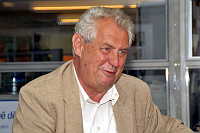 Miloš Zeman, photo: Šárka ŠevčíkováAccording to the Czech Constitution, the president’s main role consists in representing the country abroad. That can be an important tool in promoting Czech exports and opening new doors to Czech firms business, says economist Ivan Pilip, a centre-right government minister from the late 1990s and a former vice president of the European Investment Bank.
Miloš Zeman, photo: Šárka ŠevčíkováAccording to the Czech Constitution, the president’s main role consists in representing the country abroad. That can be an important tool in promoting Czech exports and opening new doors to Czech firms business, says economist Ivan Pilip, a centre-right government minister from the late 1990s and a former vice president of the European Investment Bank.
“The Czech Constitution really does not give the president much influence on the development of the economy. From a symbolic point of view, he can promote business and the country’s focus on certain parts of the world. So from this point of view, both candidates are pro-business and pro-market, there is no doubt about it.
“Regardless of the fact that Mr Zeman is much closer to the left side of the political spectrum, he is not against free market and business. As for the geographical orientation, both declare themselves as pro-European but Mr Schwarzenberg is probably someone who would much more support the country’s orientation towards the EU and also transatlantic cooperation.”
In a survey by the daily Hospodářské noviny, some Czech business leaders expressed support for Miloš Zeman because of his expertise, others said they would back Karel Schwarzenberg because he would better represent the country. Do you agree that these are the respective candidates’ strong points?
“I think that both are right. Mr Zeman has much more experience with business, he is also an economist by education, and he was the prime minister so he was much more involved in decisions about economic policies.
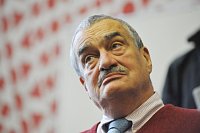 Karel Schwarzenberg, photo: CTK“On the other hand, Mr Schwarzenberg has very good international reputation but as foreign minister, he above all focuses on the general foreign policy, on human rights and other issues that are so closely linked to business.”
Karel Schwarzenberg, photo: CTK“On the other hand, Mr Schwarzenberg has very good international reputation but as foreign minister, he above all focuses on the general foreign policy, on human rights and other issues that are so closely linked to business.”
Ilona Švihlíková is a professor at Prague’s College of International and Public Relations. She is critical of the current government’s economic policies, and says Miloš Zeman was the first Czech cabinet leader to focus on economic diplomacy.
“From the economic point of view, I would definitely prefer Miloš Zeman. He had good results in the past, and talking of the president’s competencies, economic diplomacy is very important, and that was Mr Zeman’s strong point. He was practically the first to pay attention to economic diplomacy and made concrete steps to promote Czech industry abroad; he made the institutions work and created new institutions to promote export and help open doors for business people to new markets where it’s more important to have political backing than just the lowest price.”
Miloš Zeman is also known for having close links to some Russian companies. According to Ms Švihlíková, that is an advantage.
“He also has good relations with Russia which is nothing bad. I don’t understand why this is considered a bad thing. I think you need a good balance between interests in the West and in East where there are interesting markets where Czech products have a good reputation which I think should be used.”
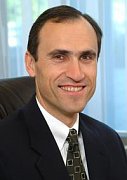 Ivan Pilip, photo: European Investment BankMiloš Zeman’s Russian connections have in fact come under scrutiny ahead of the presidential elections. The head of the Czech branch of the Russian state-owned petroleum firm Lukoil contributed to Mr Zeman’s campaign, although the candidate said it was a personal donation rather than a contribution by the firm itself. Ivan Pilip also questions the benefits of the candidate’s pro-Russian stance for the economy.
Ivan Pilip, photo: European Investment BankMiloš Zeman’s Russian connections have in fact come under scrutiny ahead of the presidential elections. The head of the Czech branch of the Russian state-owned petroleum firm Lukoil contributed to Mr Zeman’s campaign, although the candidate said it was a personal donation rather than a contribution by the firm itself. Ivan Pilip also questions the benefits of the candidate’s pro-Russian stance for the economy.
“The question is whether this would be an advantage for the country or for just a few groups of entrepreneurs who support Mr Zeman. The real effect of Czech exports to Russia is marginal and there is no real chance of the Czech economy significantly benefiting from a re-orientation of exports towards new markets like Russia.
“Some groups could find this helpful but this is also something Mr Zeman has been criticized for; he is close to groups with links to Russia including the CEO of Lukoil’s Czech branch and some other people. But this could hardly affect the structure of Czech export.”
Miloš Zeman has promised that, if elected, he would be an active president who would much more than his predecessors participate in day-to-day politics. He said he would for instance attend government and parliament sessions and consult with ministers in the phase when they are still shaping policies. But Ivan Pilip believes such an approach would have a limited impact.
“There is no doubt that Mr Zeman would try to interfere with politics. I don’t think however this would influence the economic policies so much; I think he would rather have much larger influence on internal party politics.”
For Ilona Švihlíková, Mr. Zeman’s pledge to be a more active president appeals to critics of the current government. It is also something that would make him a predictable president, unlike his rival for the post, Karel Schwarzenberg.
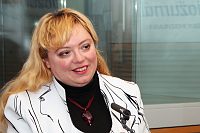 Ilona Švihlíková, photo: Alžběta Švarcová“It depends of course which side you take. Leftists would certainly welcome Miloš Zeman who would be an activist president against the current government - using e.g. veto against some reforms in the social field. But it depends of course on the constellation and the situation. Miloš Zeman would definitely be an actor and he is a very strong figure but we know that and we know what to expect from him.”
Ilona Švihlíková, photo: Alžběta Švarcová“It depends of course which side you take. Leftists would certainly welcome Miloš Zeman who would be an activist president against the current government - using e.g. veto against some reforms in the social field. But it depends of course on the constellation and the situation. Miloš Zeman would definitely be an actor and he is a very strong figure but we know that and we know what to expect from him.”
“Karel Schwarzenberg on the other hand, his policy is… well, the whole time I’ve had the feeling that he’s playing according to someone else’s notes, so I think that he would be quite unpredictable.”
The Czech president has an important authority that affects the country’s economic policy. The head of state appoints members of the board of the Czech National Bank. When asked about their choices of appointees, Karel Schwarzenberg only gave a general answer – unlike Miloš Zeman who came up with specific names, including two economists working for the Czech trade unions. So how would the central bank’s strategy change? Ivan Pilip thinks the change would not be that important.
“In my opinion there is a certain culture and tradition of the Czech Central Bank that is hawkish, let’s say. It has a strong anti-inflation strategy and I don’t think that the appointment of new members by maybe Mr Zeman will change the policy so much; maybe the people appointed by him would be more pro Euro than the present members of the Central Bank. However also from this point of view, the candidates appointed by Mr Schwarzenberg, whoever it would be, would in any case be much more pro Euro and pro European than the present members.”
Ilona Švihlíková, on the other hand, believes Miloš Zeman would want to have a bigger say than that.
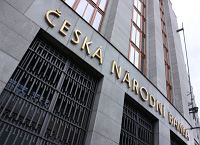 Photo: archive of ČRo 7 - Radio Prague“I believe that he indicated that he would like the Central Bank not only to take inflation into account but he also has a broader look at the economy as a whole. So I think he would want the bank to drop this position of inflation targeting and adopt a more balanced position towards the whole economic development.”
Photo: archive of ČRo 7 - Radio Prague“I believe that he indicated that he would like the Central Bank not only to take inflation into account but he also has a broader look at the economy as a whole. So I think he would want the bank to drop this position of inflation targeting and adopt a more balanced position towards the whole economic development.”
In terms of the Czech policy towards the European Union, both presidential candidates promise a change in direction set by the outgoing president Václav Klaus, a fierce critic of the bloc. Both Miloš Zeman and Karel Schwarzenberg say they would return the Czech Republic back into the EU mainstream, although Mr. Zeman has suggested that the EU should have much closer relations to Russia, which is not a commonly held view among other members.
So which of the candidates is better suited to help boost the Czech economy and represent Czech business interests? Ivan Pilip points to Karel Schwarzenberg.
“For me, the international reputation and the real internal orientation on the European Union and trans-Atlantic cooperation is much more important and it is something that Mr Schwarzenberg represents. The role of the President as a personality, as someone who sets some kind of orientation of a country is much more important for the election and from this point of view, I think Mr Schwarzenbeg would be a much better choice. But on the other hand Mr Zeman also has the expertise we spoke about and I don’t think that he would cause any damage to the Czech economy or even to the country as a whole.”
Ilona Švihlíková’s opinion is diametrically opposed to that of Mr. Pilip.
“I have to say, I’m going to vote for Miloš Zeman, despite all his failures – of course I know about them, that’s nothing new! But Miloš Zeman, whatever you think of him, is a predictable politician; you know what he’s saying, he’s got his long-term views and he follows them. As I said, he’s got the results so you can take it or leave it, but you can see that something has been done in the past and of course he also said well, that’s what I did and I will continue, I wouldn’t change my views in this.”
———
Zpět